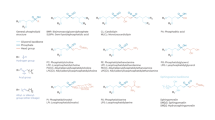Abstract
Objective: Unfiltered coffee raises serum LDL cholesterol in humans, owing to the presence of the diterpenes cafestol and kahweol. Norwegians with a chronic high intake of unfiltered coffee also had elevated serum levels of lipoprotein(a), an LDL-like particle which is insensitive toward dietary interventions. We now experimentally studied the influence of coffee diterpenes on lipoprotein(a) levels. Design: Four randomised controlled trials. Subjects: Healthy, normolipidemic volunteers. Interventions: Coffee, coffee oil, and pure diterpenes for 4–24 weeks. Main outcome measures: The circulating level of lipoprotein(a). Results: In 22 subjects drinking five to six strong cups of cafetiere coffee per day, the median fall in lipoprotein(a) was 1.5 mg/dL after two months (P=0.03), and 0.5 mg/dL after half a year (P>0.05), relative to 24 filter coffee drinkers. Coffee oil doses equivalent to 10–20 cups of unfiltered coffee reduced lipoprotein(a) levels by up to 5.5 mg/dL (P<0.05) in two separate trials (n=12–16 per group). A purified mixture of cafestol and kahweol, as well as cafestol alone, were also effective in reducing Lp(a) levels (n=10). Averaged over the four trials, each 10 mg/d of cafestol (plus kahweol)—the amount present in two to three cups of cafetiere coffee—decreased Lp(a) levels by 0.5 mg/dL or 4% from baseline values after four weeks (n=63). Conclusions: Coffee diterpenes are among the few dietary exceptions shown to influence serum lipoprotein(a) levels. However, the Lp(a)-reducing potency of coffee diterpenes may subside in the long run, and their adverse side effects preclude their use as lipoprotein(a)-reducing agents. Sponsorship: Supported by the Netherlands Heart Foundation through grant No. 900-562-091 of the Netherlands Organization of Scientific Research (NWO), plus supplemental funding by the Institute for Scientific Information on Coffee.
This is a preview of subscription content, access via your institution
Access options
Subscribe to this journal
Receive 12 print issues and online access
$259.00 per year
only $21.58 per issue
Buy this article
- Purchase on Springer Link
- Instant access to full article PDF
Prices may be subject to local taxes which are calculated during checkout
Similar content being viewed by others
Author information
Authors and Affiliations
Rights and permissions
About this article
Cite this article
Urgert, R., Weusten-van der Wouw, M., Hovenier, R. et al. Diterpenes from coffee beans decrease serum levels of lipoprotein(a) in humans: results from four randomised controlled trials. Eur J Clin Nutr 51, 431–436 (1997). https://doi.org/10.1038/sj.ejcn.1600414
Received:
Revised:
Accepted:
Issue Date:
DOI: https://doi.org/10.1038/sj.ejcn.1600414
Keywords
This article is cited by
-
Current evidence for the use of coffee and caffeine to prevent age-related cognitive decline and Alzheimer's disease
The Journal of nutrition, health and aging (2014)
-
Filtered coffee raises serum cholesterol: results from a controlled study
European Journal of Clinical Nutrition (2003)



